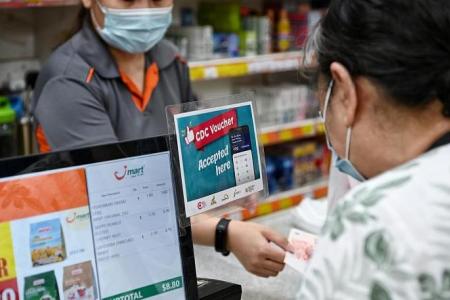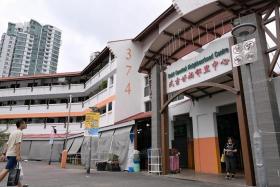More than $163m in CDC vouchers spent so far at heartland businesses
Vouchers worth $100 given to every Singaporean household to use at heartland shops and food stalls this year and last have been well-received, with more than $163 million out of $250 million spent to date, said Ms Low Yen Ling, Minister of State for Trade and Industry, on Tuesday (July 19).
In addition, $200 more in these Community Development Council (CDC) vouchers will be given early next year, and another $200 in 2024, and major supermarkets will be roped in for the next two years.
Speaking to coffee shop owners at an event for the Foochow Coffee Restaurant and Bar Merchants Association, where she also announced enhanced help schemes for businesses, Ms Low said the CDC Voucher scheme had been useful for both families and businesses. Over 86.8 per cent or 1.06 million households so far have claimed their 2022 CDC vouchers, which were made available in May.
The vouchers for last year disbursed in December were claimed by 96.8 per cent or 1.18 million Singaporean households.
Of the total spent, $27 million or 16.6 per cent was at 2,800 stalls from 677 coffee shops, said Ms Low.
To date, more than 17,700 heartland merchants and hawkers are on board the scheme. One in six are stalls in coffee shops.
Speaking in both English and Mandarin at the inauguration ceremony of the association's 82nd executive committee at the Foochow Building at Tyrwhitt Road, Ms Low said the food services sector had battled several waves of disruptions from the Covid-19 pandemic, but many had overcome the challenges with new modes of operation, including the adoption of technology.
As the global situation remains uncertain, Ms Low assured businesses that the government will help to cushion near-term energy cost increases and provide additional support for local businesses with cash flow concerns.
First, it brought forward the disbursement of the Small Business Recovery Grant to provide one-time cash support of up to $10,000 to small businesses most affected by the pandemic restrictions. Over 40,000 eligible businesses have received the grant.
Second, it will co-fund efforts by SMEs to be more energy efficient, through a new Energy Efficiency Grant. The grant will run from Septemberto March next year and will provide SMEs in the food services, food manufacturing and retail sectors with up to 70 per cent support to adopt energy-efficient equipment.
Third, the government has enhanced its co-funding share of wage increases for low-wage workers and other vulnerable workers. Under the Progressive Wage Credit Scheme, it has increased its co-funding share for wage increases in 2022 from 50 per cent to 75 per cent for wages up to $2,500, and from 30 per cent to 45 per cent for wages above $2,500 and up to $3,000.
It has also extended the Jobs Growth Incentive (JGI) for another six months till March 2023 to sustain support for employers of mature workers, people with disabilities, and ex-offenders.
The Food Services Industry Transformation Map 2025 was also launched earlier this year to focus on growth strategies such as digitalisation and catalysing innovation. There will be a refreshed Food Services Industry Digital Plan to guide businesses in using advanced technology to support their digital transformation.
Mr Hong Poh Hin, chairman of the association, which represents more than 400 coffee shops, said they have faced many challenges in the last few years because of the Covid-19 pandemic and the ongoing Russia-Ukraine crisis. These include shortages of manpower and raw materials, rises in energy prices and inflation.
However, he said, many coffee shops have been able to weather the storm with the support and assistance given by the government. They have also actively supported the government's policies and adapted to consumers' changing needs, such as allowing online orders, group buys, food delivery, cashless payment.
Mr Hong, 74, also spoke about the recent record transaction prices of some coffee shops. A food and beverage giant forked out $40 million in June for a coffee shop in Yishun. The transaction followed two other recent high-price sales: one in Tampines changed hands for a record $41.68 million, while another there went for $16.8 million.
He said transactions are decided by supply-demand market forces, and the buyers and sellers involved.
"The coffee shops involved face tough competition," he said. "There has been no marked increase in food prices, and the higher costs are not passed on to consumers."
He added that coffee shops are still where Singaporeans can enjoy economical meals.
Mr Hong is also part of the Committee Against Profiteering (CAP) chaired by Ms Low. It looks into feedback on unjustified price increases of essential products and services.
Speaking in Chinese, Ms Low said: "Maintaining transparent and fair prices will protect the good reputation of the association. It will also ensure that coffee shops will remain a good place for Singaporeans to dine and mingle."
Get The New Paper on your phone with the free TNP app. Download from the Apple App Store or Google Play Store now



